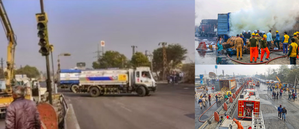Jaipur, Dec 22 (IANS) The devastating incident on the Jaipur-Ajmer Highway on December 20, which claimed 13 lives, has its roots in a sharp U-turn near Delhi Public School (DPS), a dangerous spot that has now become infamous for claiming numerous lives. According to officials, this U-turn should not have been in use, as it was sanctioned as a temporary arrangement in a bid to ease traffic flow during construction activity.
Originally, the U-turn was supposed to be closed by March 2023, as part of a plan for a cloverleaf interchange, but the project was stalled, leaving it open. Built in November 2020, it was intended to streamline traffic flow from the newly constructed Ring Road. The cloverleaf interchange remained incomplete, and the U-turn stayed operational, facilitating traffic from both directions, also creating a jam-like situation most times.
Navneet Jhalani, co-convenor of Bagru Udhyog Mitra, said, “The foundation for Friday’s tragic accident was laid six years ago when the ring road was rushed through to bypass election restrictions. The cloverleaf interchange, which was supposed to be constructed, remains pending.” He added that multiple memoranda were sent to the National Highways Authority of India (NHAI) to address this issue.
Had the accident occurred even an hour later, the consequences could have been far worse, particularly for DPS students and other nearby schools, whose buses pass through this stretch. Additionally, office workers from the nearby SEZ would have faced severe risks. “The situation could have been horrific if it were a little later,” said Pawan Bairagi, a government official whose children study at DPS.
The U-turn is just one of many dangerous cuts on this highway. According to NHAI norms, a U-turn should be spaced every 2 km, yet this stretch is riddled with frequent, short-distance cuts, making it resemble a street rather than a national highway.
Surprisingly, there are around 12 cuts on the service lane between Jaipur and Ajmer and 15 cuts on the opposite stretch. In addition, the railing along the service road is broken in several places, with people often seen jumping across. Traffic jams spanning kilometres are a daily occurrence, yet there is no visible traffic police presence to alleviate the situation, despite the road being a key route for travellers to Jodhpur, Udaipur, Chittorgarh, and other important destinations.
The Jaipur-Ajmer Expressway, which witnessed a horrific inferno that left over a dozen dead due to burn injuries, has become a hotspot for accidents in the last year. In July 2023, the local administration clashed with NHAI over the ongoing flyover construction, which had caused massive traffic jams. Despite assurances from NHAI that the work would be completed quickly, over a year later, the work remains unfinished, exacerbating traffic issues.
Despite numerous complaints about the traffic jams, including those caused by rain, the construction work continues at a slow pace. Now, with 13 lives lost and many more critically injured in Friday’s blaze, questions are being raised about who is accountable for the tragedy. The Rajasthan High Court has taken suo motu cognizance of the fire accident, issuing notices to the Chief Secretary and the Union government. It is asking about the steps being taken to hold authorities accountable and investigate any negligence.
The court has ordered an investigation into the fire accident, focusing on preventing similar incidents in the future. The Supreme Court’s Committee on Road Safety has also instructed the Chief Secretary of Rajasthan to submit a detailed report by January 20, while a high-level committee will investigate all aspects of the incident, including the road’s construction.
Meanwhile, the debate over the dangerous U-turn near DPS continues. The NHAI has defended the decision, stating that the U-turn was approved by a committee of officials from the Jaipur Development Authority (JDA), NHAI, and traffic police. According to NHAI, the cut, which was designed to be 30 meters wide, was equipped with traffic lights, road markings, and signboards. However, the tragic event has once again highlighted the need for better safety measures.
In response to the accident, NHAI has called for enhanced safety protocols at critical junctions, including round-the-clock traffic police deployment, better protection for flammable materials, mandatory vehicle checks, and public awareness programmes on road safety.
Bus driver Kailash Gurjar, who takes students along this road daily, expressed frustration, saying, “It might seem like the driver’s fault, but the real issue is the officials who never bother to see the daily struggles of commuters. Long jams, people jumping over railings, and accidents are common. The administration must wake up before more lives are lost.” Gurjar, who tragically lost his brother in an earlier accident on the same road, hopes for action to prevent further tragedies.
Despite the deaths and the objections from all quarters, the U-turn remains open and vehicles continue to ply.
–IANS
arc/dpb






























